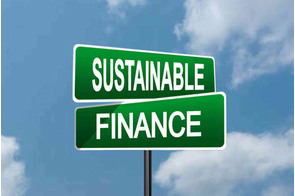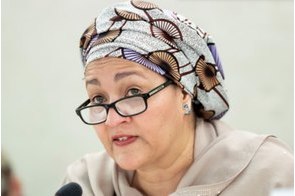Achieving holistic sustainability

Summary
ESG only constitutes an aspect of sustainability.
In my presentation on the above topic at the 21st conference of Risk Management Association of Nigeria (RIMAN) last month in Lagos, I used wheat as a metaphor for how the world is drifting from the path to sustainable development – or sustainability. As a result of the ongoing Russia’s war with Ukraine, there has been a downside shock to the supply of the grain and an upside shock in its price around the world. The impact of this is mostly felt in the developing countries already grappling with multiple challenges, including the lingering economic impact of Covid-19, high cost of servicing public debt, and general rise in prices.
The war is also responsible for energy price increases in the advanced economies, pushing inflation above their long-term targets and to levels unseen in decades.
The inflationary pressure arising from the dislocation of the supply chains of these two commodities has been impacting public finance, businesses and households. In reacting to the medium- to long-term effects of the war, Europe’s largest economy, Germany, has indicated that it would restart power generation from coal – something it had stopped because of the environmental hazard it causes.
The lesson is that negative events like war, somewhere in the world, can derail development progress in other parts of the world – or virtually everywhere. As the world cannot be sustainable until every region of it is, no country can be sustainable if all its major constituents are not. This is also the same for businesses. They cannot achieve sustainability through efforts isolated in their operational silos, or by treating it as an add-on to their business-as-usual.
Various malpractices have called into question the very idea of sustainability. Last month, regulators established with evidence that DWS, a subsidiary of Deutsche Bank, was overstating its commitment to Environmental, Social and Governance (ESG) best practices in its investment prospectus to investors. Outrightly, this is fraudulent. Other malpractices in sustainability include “greenwashing”, which involves the exaggeration of the delivery of an organisation’s commitment to sound environmental practices. This and its variants – “sustainability-washing”, “social-washing” and “SDG-washing” – do not necessarily mean financial fraud is being deliberately committed beyond the unfair advantage conferred on the unscrupulous practitioner.
Yet, there is also the over-selling of the impact of sustainability – especially in the short-term. Two other issues are lack of data to back sustainability claims, and the fact that the regulation and practice of ESG are often not far-reaching and isolated. The good news is that a lot is being done to address these shortcomings, but they nevertheless leave risk professionals confused or misguided. The RIMAN did well by helping its members gain understanding and clarity on the issues at the conference.
One of the big statements of my presentation is that ESG only constitutes an aspect of sustainability. Broadly, sustainability – or what the European Organisation for Sustainable Development (EOSD) calls “holistic sustainability” for emphasis – entails achieving long-term institutional profitability, contributing to economic development, and maintaining good environmental, social and governance risk and opportunity practices. This is an all-or-nothing concept. If an organisation is not doing well on any of these factors – at its level, either as a multination corporation, a local SME or micro business – it is not sustainable. And if it is not “holistic sustainability”, it is not sustainability.
This does not mean that truly committed organisations don’t face challenges on their sustainable journey. They do, and the frequency of global crises have become quite high. But sustainable organisations are those that are equipped not only to manage the risks but to also turn them into profitable opportunities.
To put it succinctly, good standards and their conscientious implementation are what is required for organisations to be sustainable. One of such standards, and perhaps the most ground-breaking, is the EOSD’s Sustainability Standards and Certification Initiative (SSCI) for value-driven financial institutions. Over the last four years, I have worked with the EOSD as its Nigeria Country Representative to support the implementation of the Sustainability Standards by three banks. Access Bank PLC and Development Bank of Nigeria have become Sustainability Certified Financial Institution, and Bank of Industry is currently implementing the standards.
The SSCI delivers its proprietary “Octagon model” to mainstream sustainability in the Governance, Management, Technology, Business Models, Products, Operations, Stakeholder Relations and Human Capital of financial institutions. The Standards provide transformative practice tools, and the certification is a well-regarded sustainability credential.
I was asked by one of the participants if “holistic sustainability” refers to the sustainable development of the world or what may be limited to the sustainability of an institution. My view is that sustainable development of the world cannot be achieved and maintained if wars persist, global supply chains are disrupted, and inflation is galloping. On the contrary, the trifecta of the events happening together at the same time will reverse development gains. Institutions will struggle to achieve their long-term goals and remain sustainable in this scenario.
For institutions to be sustainable, they have to play their roles in contributing to sustainable socio-economic development and environmental preservation. As governments set goals for achieving these in their national development plans, even so are businesses – especially financial institutions because of their influential role of facilitating production – to set goals that align with, and help in achieving, the national or regional development goals. This is why SSCI makes it mandatory for certification, that value-driven financial institutions support the delivery of national/global development goals. So doing, they will also be achieving their institutional purpose and well-informed corporate goals.
Related
-
Global sustainable debt market grows by 26 percent to $247 billion
While green bonds made up the largest part of the sustainable finance market in 2018, attention is now shifting to a ...
-
Access Bank joins global efforts to mobilise financing for sustainable development
Access Bank was among the banks that developed the UN Principles for Responsible Banking.
-
Finnfund issues EUR 200 mn multi-tranche green and sustainable bonds
Finnfund’s investments, commitments, and investment decisions total about 1.22 billion euros, half of them in Africa.










